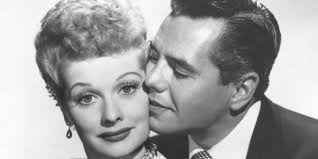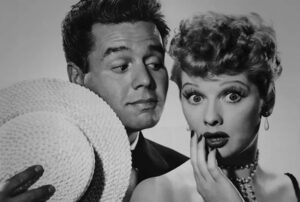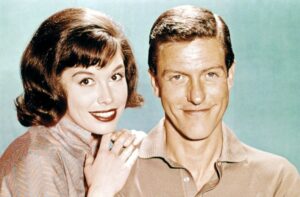
Introduction: A Nostalgic Twist in the Marvel Universe
Marvel’s WandaVision swept audiences off their feet with its unconventional storytelling, blending superhero drama with classic sitcom aesthetics. But was the show inspired by the legendary Lucille Ball and her iconic I Love Lucy series? Let’s explore how WandaVision pays homage to television’s golden age while carving its unique path.
What Made ‘WandaVision’ Stand Out?
Marvel took a bold leap with WandaVision, a series that moved beyond action-packed battles to embrace heartfelt storytelling. Its retro sitcom style wasn’t just a creative choice; it was a love letter to TV history. From the black-and-white opening episodes to canned laughter, the show had I Love Lucy’s DNA written all over it.
Lucille Ball: A Pioneer in Television
Lucille Ball didn’t just star in I Love Lucy—she revolutionized the way TV was made. Her comedic timing, groundbreaking storytelling, and relatable characters set a standard that sitcoms still follow today. It’s no wonder her influence would reach something as modern and ambitious as WandaVision.

The Black-and-White Beginning: A Clear Nod to the 1950s
When WandaVision premiered, viewers were transported to a 1950s sitcom world. The show’s early episodes featured a black-and-white aesthetic and a lighthearted tone—elements unmistakably reminiscent of I Love Lucy.
Shared Traits With ‘I Love Lucy’:
- Domestic Humor: Wanda and Vision’s quirky suburban life mirrored Lucy and Ricky’s shenanigans.
- Physical Comedy: From Vision swallowing gum to Wanda’s attempts to hide her powers, the humor felt like a Marvel twist on Lucy’s classic gags.
- Sitcom Archetypes: Wanda played the role of the loving (if slightly chaotic) housewife, much like Lucy.
Elizabeth Olsen Channels Retro Charm
Elizabeth Olsen’s portrayal of Wanda Maximoff brought a genuine, retro feel to the screen. From her mannerisms to her wardrobe, she embraced the 1950s housewife archetype, echoing Lucille Ball’s ability to balance humor with heartfelt moments.
Marvel’s Masterful Blend of Nostalgia and Mystery
While the sitcom elements were charming, WandaVision layered its narrative with a sense of unease. Much like Lucy often got herself into chaotic situations, Wanda found herself grappling with the chaos of her own making—but with far darker consequences.
Why ‘I Love Lucy’ Remains Timeless
Even decades later, I Love Lucy continues to resonate. Its universal themes of love, ambition, and mischief are timeless. WandaVision tapped into this universality, blending it with Marvel’s flair to appeal to audiences old and new.
Beyond ‘I Love Lucy’: Other Sitcom Influences
While I Love Lucy provided a foundation, WandaVision also drew inspiration from other eras of television:
- The 1960s: Shows like Bewitched and The Dick Van Dyke Show influenced the magical, suburban aesthetic.
- The 1970s and Beyond: Later episodes embraced styles from The Brady Bunch to Modern Family.
The Role of Humor in ‘WandaVision’
Humor was a key ingredient in both I Love Lucy and WandaVision. However, while Lucy used comedy to explore everyday struggles, Wanda’s sitcom humor masked her grief—a powerful twist on the genre.

Lucille Ball’s Legacy in Modern TV
Lucille Ball’s influence extends far beyond I Love Lucy. Her innovative approach to television production and her ability to connect with audiences laid the groundwork for shows like WandaVision.
WandaVision: A Love Letter to Television
By exploring different sitcom eras, WandaVision didn’t just reference shows like I Love Lucy—it celebrated the evolution of television as a medium. It was a nostalgic ride through TV history, seen through the lens of a grieving superhero.
Did Marvel Intend to Reference ‘I Love Lucy’?
The creators of WandaVision acknowledged their love for classic TV, though they never explicitly stated I Love Lucy was a direct influence. However, the parallels are hard to ignore.
Key Similarities Include:
- Breaking New Ground: Just as I Love Lucy redefined sitcoms, WandaVision redefined what a Marvel show could be.
- Relatable Characters: Both shows balanced extraordinary circumstances with relatable, human struggles.
What Makes ‘I Love Lucy’ a Perfect Template?
The simplicity and charm of I Love Lucy made it an ideal inspiration for WandaVision’s retro episodes. Its ability to mix lighthearted fun with genuine emotion mirrors Wanda’s journey perfectly.
The Emotional Core of Both Shows
At its heart, I Love Lucy was about love and partnership. Similarly, WandaVision explored Wanda and Vision’s deep bond, albeit in a much more tragic context. Both shows reminded viewers of the importance of love in overcoming life’s challenges.
A Modern Spin on Classic TV
WandaVision wasn’t content to merely replicate past sitcoms. Instead, it used them as a springboard to tell a story about grief, identity, and resilience. This modern spin is what made the show so compelling.
Why Fans Loved the Sitcom Approach
Fans adored WandaVision’s sitcom structure because it felt familiar yet fresh. By referencing shows like I Love Lucy, the series created a comforting backdrop for its more dramatic moments.
Conclusion: A Magical Mash-Up of Nostalgia and Innovation
While WandaVision stands as its own unique creation, the influence of I Love Lucy is undeniable. From its humor to its heartfelt moments, Marvel’s series borrowed from the past to craft something entirely new. It’s a testament to how timeless classics can continue to inspire even the most modern stories.
FAQs
1. Was ‘WandaVision’ directly inspired by ‘I Love Lucy’?
While Marvel hasn’t confirmed it directly, the parallels in style and humor make it clear that I Love Lucy was a significant influence.
2. What other shows inspired ‘WandaVision’?
The series drew inspiration from several sitcoms, including Bewitched, The Dick Van Dyke Show, and Modern Family.
3. How does ‘WandaVision’ differ from classic sitcoms?
WandaVision used the sitcom format to mask deeper themes like grief, making it a unique blend of nostalgia and drama.
4. Why is Lucille Ball considered a TV pioneer?
Lucille Ball revolutionized television with her comedic brilliance and behind-the-scenes innovations, setting standards for future shows.
5. Will there be more Marvel shows like ‘WandaVision’?
Marvel continues to experiment with storytelling formats, so future shows may explore similar creative directions.